How do we define individual happiness? Having the freedom to choose your own path in life, maintaining positive relationships and being accepted into society, or achieving goals that you have set out for yourself and keeping positive when trying to achieve them. Aspects contributing to happiness can differ from person to person, but what makes us feel sensations of happiness, closeness, and joy?
Happy Hormones! 🙂
What are Happy Hormones?
From our desire to eat to the amount of sleep our body needs, hormones affect the body’s functioning in more ways than one. The happy hormones make you feel positive, happy, and full of joy. Happiness, if seen scientifically, is just a bodily function that takes place when certain hormones are released in the body. Happy hormones boost mood and promote wellbeing in many ways. Some are able to alleviate anxiety and prevent depressive symptoms while others trigger pleasure, joy, bonding, and trust.
4 types of happiness hormones (D.O.S.E):
- Dopamine
- Oxytocin
- Serotonin
- Endorphin
1. Dopamine
This hormone is part of the brain’s reward system — it’s what gives you pleasurable sensations and keeps you coming back for more. Dopamine is considered to be the motivational cog in this system, and it’s naturally released when you perceive food or sex, but before you consume it. Hunt for money releases more dopamine than receiving money.
Dopamine – the motivational molecule
Dopamine is connected with humans’ most basic instinct – hunting and gathering. Humans had hunted to survive and acquire resources e.g. food, knowledge, supplies. The need to acquire resources is a part of our brain’s operating system. Our ancestors felt the joy of dopamine when they found a fishing hole after hungry wandering. Dopamine, the pleasure-seeking hormone, is released by the brain’s hypothalamus. Dopamine connects neurons, so your brain turns on the dopamine the next time you see signs of a fishing hole. Some situations as an example when dopamine gets released in our body:
- when an alcoholic sees a bar
- when a video game player wins points
- when someone sees his efforts are rewarded
- when an employee about to get a promotion or award
- when a drug user finds a new supply
Products that capitalize on dopamine
Facebook:
If you’ve been a Facebook user for more than a few years, you must have observed the changes in its criteria for notifications. When you first join Facebook, your notification center revolves around the initial set of connections you make, the social reward. As you begin interacting with various groups, events, and artists, that notification center will also become more active. After a while, you’ll be able to open the app at any time and reasonably expect to be rewarded. Every time, you have a pretty strong incentive to check in whenever you can.
Instagram:
Instagram’s implementation of a variable-ratio reward schedule (read more about variable reward here). When you make your post, you may be disappointed to find fewer responses than you expected, only to receive them in a larger bunch later on. Your dopamine centers have been primed with a variable reward schedule that takes advantage of our dopamine-driven desire for social validation, and it optimizes the balance of negative and positive feedback signals until we’ve become habitual users.
Games:
While playing games, the human brain is wired to crave instant gratification, fast pace, and unpredictability. All three are satisfied with digital games. Gamers are always on the hunt for instant gratification in terms of level completion or points etc, and the unpredictability of each play makes users more glued to their screens. Playing games floods the pleasure center of the brain with dopamine.
Tinder (Dating apps):
Humans are pleasure seekers. We strive to feel emotions and sensations. We live for it. Humans seek bodily pleasure – the most basic instinct of human beings. The anticipation and suggestion of sensuality produce a much longer pleasure response than actually receiving it. Tinder works on the same concept.
2. Oxytocin
Oxytocin gives you a good happy feeling when you’re with someone you trust. Oxytocin is triggered by closeness, that’s why it’s the cuddle hormone. Oxytocin secretion happens in response to stimuli perceived by the brain which is carefully monitoring your environment for threats (and seeking safety) using your ears, eyes, taste, touch, and smell. It’s produced in response to touch and even the right kind of eye contact and released by the pituitary gland.
Oxytocin – the cuddle hormone
Oxytocin acts as a neurotransmitter that helps regulate stress responses and calm the nervous system. Social trust feels good because social alliances promote survival. It’s been spotted in human bonding, generosity, and establishing trust and linked to greater perceived love, responsiveness, and gratitude.
Products that capitalize on Oxytocin:
Whatsapp or Facebook Messenger (or any Instant messenger):
Instant messenger enables us to get in touch with our loved ones and we feel relieved once we get to know they are safe. Many times, a call between loved ones assures each other about their safety and happiness.
Video call apps (Zoom, Google Meet, etc):
In today’s digital world, family members are spread all over the world and online video tools are enabling them to get in touch with each other and see each other. Looking at each other expressions releases Oxytocin at a greater level and calms the nervous system.
3. Serotonin
Serotonin is the original happy hormone, essential for mood, digestion, sleep, brain function, and circadian rhythm. Its primary job is to make you feel important. Whenever it is released inside the body, it stabilizes the mood and promotes happiness. We have specially-adapted neurons to help us feel what others feel, which provides evidence that we survive through our empathy for one another. We’re meant to be part of a tribe so our brains seek out rewards that make us feel accepted, important, attractive, and included. Our brain seeks importance because that promotes survival in the state of nature.
Serotonin – the feel-good hormone
Unlike Dopamine (released in the brain), it is released in the guts. Hence, its gratification is not short-term, but long-term e.g. contentment and it is dependent a lot on what you eat.
They remind us that we are valued and have much to value in life. If you need a serotonin boost during a stressful day, take a few moments to reflect on past achievements and victories.
Products that capitalize on Serotonin:
Google:
Knowledge is a basic human need. We have been fascinated with knowledge since antiquity. We make queries each day on Google that had never been asked before. More than anything else, we want to know. Serotonin is a reward for knowledge hunters that promotes survival in today’s connected world.
Linkedin:
This app provides authority, and influence, and attention to the ones who seek it. Users brag about their achievements, victories, and opinions, feedback on which makes them feel important and stabilizes the mood.
Photos/videos storage apps (Gallery etc):
Humans crave social bonding and valuable moments that make them feel important. When they don’t have the opportunity of meeting or connect digitally with their loved ones, they look back to the memories they have had. It reminds us that we are valued and have much to value in life. If you need a serotonin boost during a stressful day, take a few moments to reflect on past achievements and victories.
Facebook (or Social media apps):
Humans crave social validations that make them feel important. Facebook, Instagram, or social media apps connect us with friends & family. These platforms not just give us yet another place on the web to establish our identities, but also the tools to enable us to enrich our lives, promote our well beings. Connection with a like-minded community makes us happier, and accepted, and loved.
Apple products:
Historically, humans are known to think irrationally just to be more attractive to potential mates, so as to satisfy our procreative hunger. The attraction to anything expressive and beautiful is deeply-seated human desires and by owning these beautiful products, serotonin is triggered that attends happiness and success. Apple-branded products are self-expressive and beautiful. Only by addressing our procreative hunger could Apple exact the most irrational margins, and a boost in serotonin.
4. Endorphin
Endorphins are hormones that make you happy, but not in the way like other above-mentioned hormones, but they function as painkillers and induce euphoria. Endorphins inhibit the transmission of pain signals in the central nervous system by binding to opioid receptors (the body’s natural morphine). Hence, it is known to reduce stress levels and bring a sense of calmness and well-being.
Serotonin – the runner’s high
Runners high” only happens when you exceed your limits. This hormone is also known to alleviate signs of depression, stress, and anxiety. It can also boost self-esteem. Laugh more, enjoy your favorite food, meditate more often and get a massage for healthy levels of endorphins.
Products that capitalize on Endorphin:
Calm:
Humans experience tiredness or stress due to individual lifestyles. At the end of the day, we seek relief from the pain of tiredness, stress, depression and calm down the pain signals. Calm is the app for meditation and sleeps that lowers stress, less anxiety, and more restful sleep with our guided meditations, sleep stories, breathing programs, masterclasses, and relaxing music. Endorphins are released due to some physical activities and Calm enables its users to perform a set of activities that help them achieve calmness and happiness.
Strava:
Humans have an innate inner drive to be self-determined and motivated to achieve mastery. We would likely see our potential as being unlimited, and we’ll constantly seek to improve our skills through learning and practice. An athlete who is motivated by mastery & purpose might want to run as fast as he possibly can, not for any medal but for the process of continuous improvement. Strava is the app that enables its users to perform a set of physical activities and get timely feedback to set benchmarks. Moreover, its users can connect to the like-minded community that inspires and pushes them to achieve more and better. Endorphin is released when users (primarily athletes) exceed their limits and feel happy.
What is your Products’ Core Job? Which Happy Hormones to focus on?
Each of these happy hormones plays a huge part in the way our bodies function: physically, mentally, and emotionally. However, happy hormones are not meant to surge all the time. They turn off when their job is done so they’re ready to alert you to the next good thing. Knowing the job each happy hormone does makes it easier for us, the product builders, to find ways to stimulate them and tie back with the benefits (the rewards) in Jobs-to-be-Done analysis <link> and create value proposition to have the most desirable product-market fit.
Let’s do the exercise to link the happy hormones with a product value proposition, as shown the below diagram. It’s divided into 3 parts i.e.
- The job of each hormone – what type of happiness is delivered
- Expected end-state – what is the reason (motivation) of using the product (or to perform the job)
- What to build in the product – after we figure-out the overlap
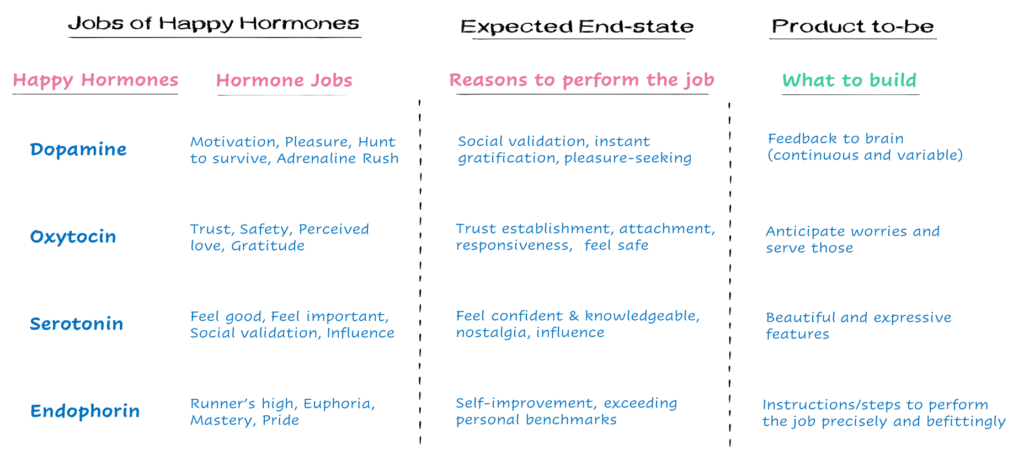
The true drivers of users’ attachment to any product or app are the hyper-social environments that products provide. Understanding what drives the users to particular behavior allows us to build products that are aligned with users’ interests. The more we know about customers’ jobs, the more we’ll be able to tie these with happy hormones’ respective jobs and take control of the effects so that customers can enjoy a healthier, happier life.
References:
atlasbiomed.com/blog/serotonin-and-other-happy-molecules-made-by-gut-bacteria
“Meet your happy chemicals” by Loretta Graziano Breuning, PhD
simplypsychology.org/operant-conditioning.html
cbsnews.com/news/brain-hacking-tech-insiders-60-minutes/

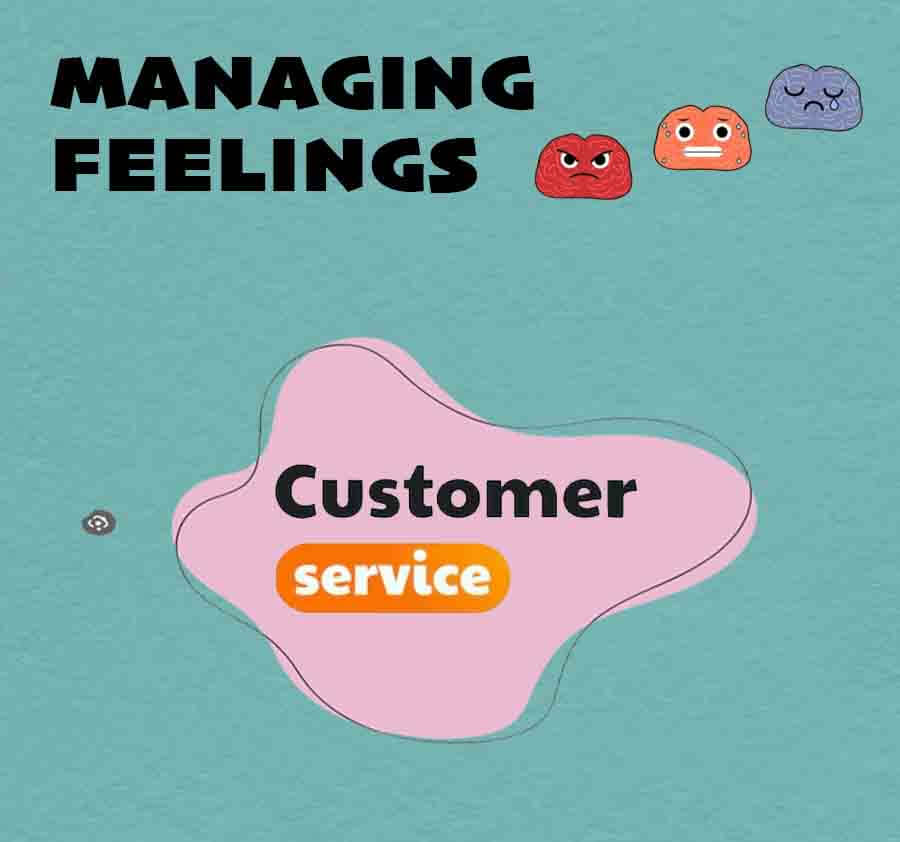
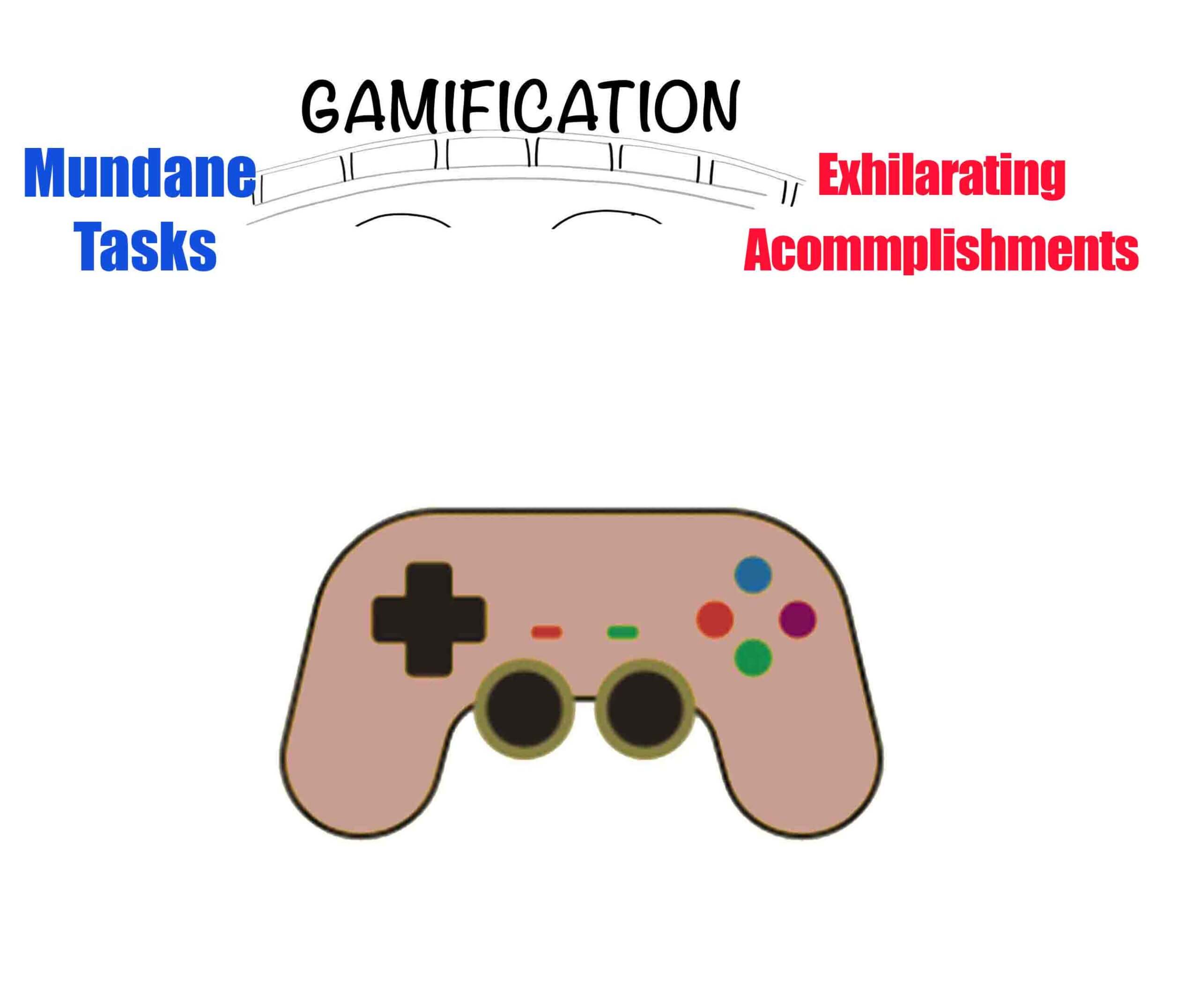
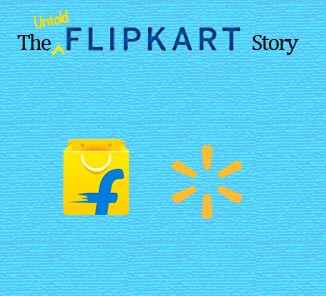
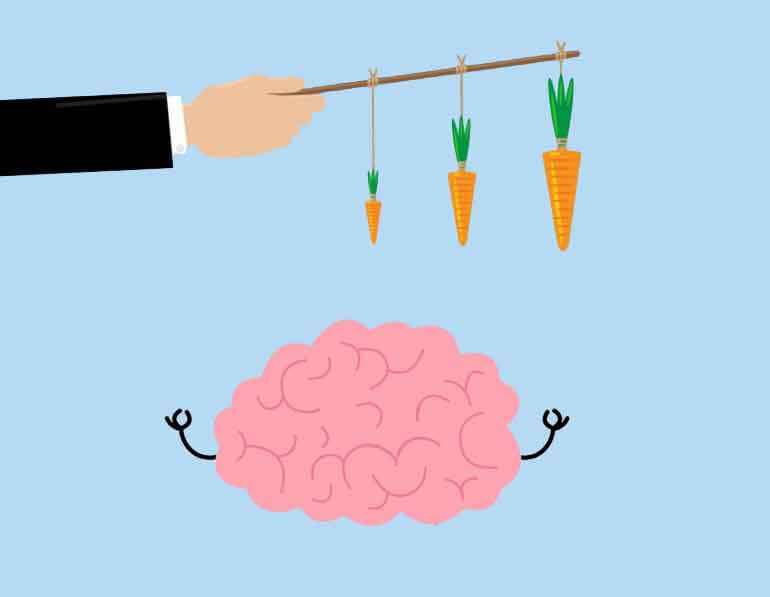
 Swipe for more stories
Swipe for more stories
Comments